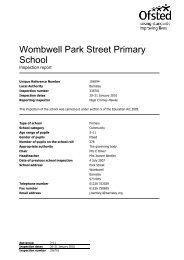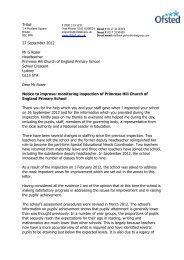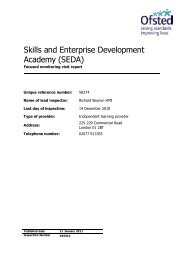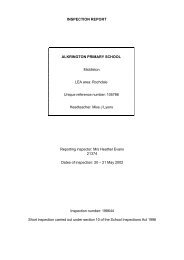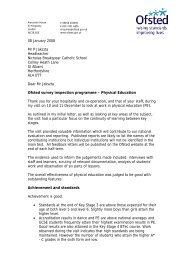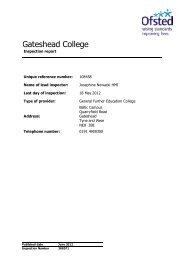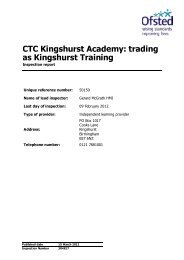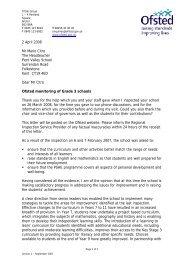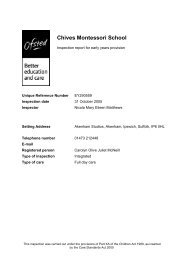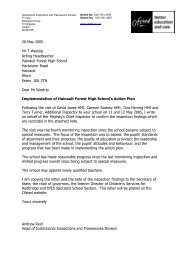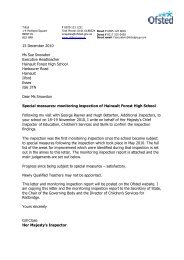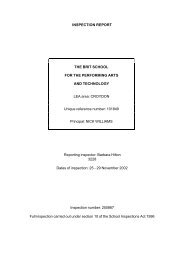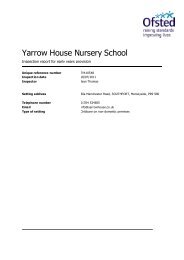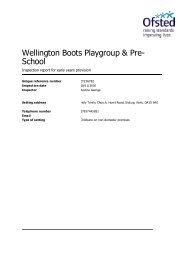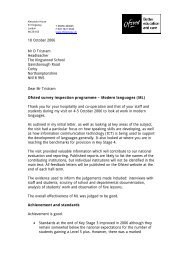pdf School inspection report - Ofsted
pdf School inspection report - Ofsted
pdf School inspection report - Ofsted
You also want an ePaper? Increase the reach of your titles
YUMPU automatically turns print PDFs into web optimized ePapers that Google loves.
foods.<br />
108. By the time they reach the end of Key Stage 2, pupils know that different solids<br />
dissolve until the solution becomes saturated. They clearly understand the importance<br />
of conducting a fair test to ensure that results are reliable. They know how to make a<br />
hypothesis, and have some grasp of how to control variables and why it is important to<br />
do so. Most pupils have well-developed investigative skills and put these to regular<br />
use.<br />
109. The school has worked hard to improve the teaching of experimental and investigative<br />
science. This work is having a positive effect on standards and reflects good<br />
improvement in provision since the last <strong>inspection</strong>. The investigative approach is fully<br />
embedded in work across all the areas of the science curriculum. Appropriate use is<br />
made of information communication technology in the subject to interpret data gained<br />
from investigations. Good use is made of available resources. For example, the site<br />
of the new school building has been exploited imaginatively as a means of studying<br />
materials and their uses.<br />
110. The teaching of science is good throughout the school. Teachers at both key stages<br />
present their pupils with interesting, often exciting activities and their enthusiasm<br />
builds positive attitudes to science. They plan and organise the work in such a way<br />
that pupils of all abilities are presented with tasks which challenge them and extend<br />
their learning. Pupils with special educational needs are given appropriate work and<br />
are supported well both by their class teachers and by well-directed support staff, so<br />
that they participate fully in the work of the class.<br />
111. Teachers use correct scientific language in a systematic way so as to enhance pupils’<br />
language. This work makes a positive contribution to the basic literacy skills of all<br />
pupils. For example, a Year 3 pupil explained her work on sound by saying, I made a<br />
sliding instrument. If there’s a little cavity, it makes a high sound. Teaching in many<br />
lessons also develops pupils’ numeracy skills, for example when reading and<br />
recording changes in temperature on a thermometer. In all lessons, teachers expect<br />
pupils to take responsibility for their own learning and to work as part of a team. This<br />
is a very effective strategy and makes a significant contribution to personal and social<br />
development. Standards of behaviour are consistently very good.<br />
112. The combination of good teaching and good class management ensures that pupils’<br />
learning is good as they move through the school. Because they are presented with<br />
interesting work which is well matched to their needs and abilities, pupils acquire skills,<br />
knowledge and understanding well at all stages. They concentrate very well and show<br />
interest and enthusiasm for what they are doing. Because they are well motivated,<br />
pupils show very good intellectual, physical and creative effort and a good pace of<br />
work is maintained. Pupils with special educational needs are effectively supported so<br />
that they also learn well.<br />
113. Science is well co-ordinated and managed and the co-ordinator has good knowledge<br />
of the subject. She has created a good ethos for learning, particularly in the improved<br />
area of investigative science.<br />
Greenhill Community <strong>School</strong> - 39



